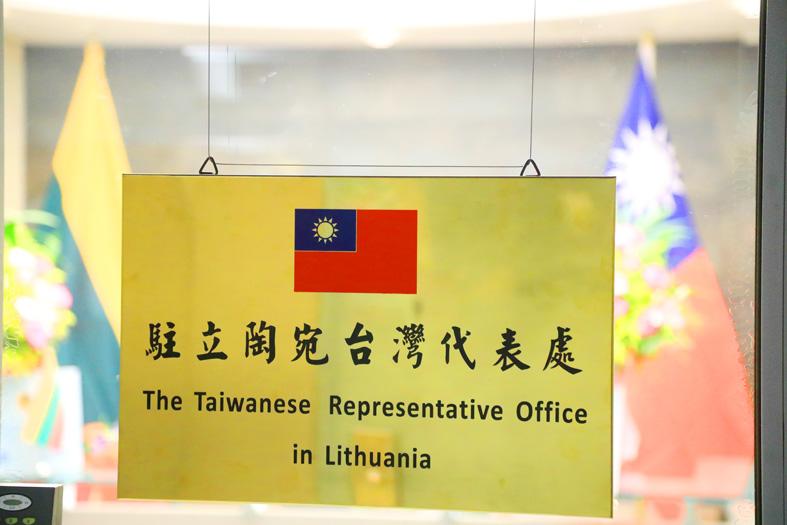An application from Lithuania to open a representative office in Taiwan has been received, the Ministry of Foreign Affairs said yesterday.
The ministry expressed its sincere welcome to Lithuania for opening an office in Taiwan and would assist as necessary, it said.
Confirmation of the application came after Lithuanian Minister of the Economy and Innovation Ausrine Armonaite said that her country was well prepared to open such an office.

Photo: EPA-EFE
“We are fully ready to open a Lithuanian trade office,” Armonaite told the Central News Agency. “And I just sent a letter to the Minister of Foreign Affairs of Taiwan, so that we could receive the official certificate so that we can open it officially, but the preparatory work is already being conducted. And we are fully ready now.”
Ministry deputy spokesman Tsuei Ching-lin (崔靜麟) said that after Minister of Foreign Affairs Joseph Wu (吳釗燮) on July 20 last year announced that Taiwan would open a representative office in Vilnius, Lithuania began the amendment process to set up an office in Taiwan.
The Taiwanese Representative Office opened on Nov. 18.
In late September last year, Lithuania’s parliament passed a legislative revision that gave the green light to open a representative office in countries like Taiwan with which the Baltic state does not have formal diplomatic relations.
Armonaite said at the time that the move by parliament would allow Lithuania to explore overseas business opportunities by boosting economic ties with other countries.
Taiwan and Lithuania are at the strategic forefront of defending democracy and freedom, and have become two like-minded partners in safeguarding their shared ideals and values, the ministry said.
Both sides have supported each other amid the COVID-19 pandemic, overcoming difficulties posed by the disease, it said.
The ministry said it firmly believes that after an office has been established on each side, Taiwan and Lithuania would step up cooperation in a wide range of fields, including post-pandemic economic recovery, trade and investment, and education and scientific research, as well as supply chain security.
Lithuania has faced political and economic pressure from Beijing over its decision to allow the use of the word “Taiwanese” in the name of Taiwan’s representative office in the Baltic state.
Taiwan typically uses “Taipei Economic and Cultural Office” or “Taipei Representative Office” as names for its de facto embassies in most countries, mainly because the host country adheres to Beijing’s “one China” principle.

CHAOS: Iranians took to the streets playing celebratory music after reports of Khamenei’s death on Saturday, while mourners also gathered in Tehran yesterday Iranian Supreme Leader Ayatollah Ali Khamenei was killed in a major attack on Iran launched by Israel and the US, throwing the future of the Islamic republic into doubt and raising the risk of regional instability. Iranian state television and the state-run IRNA news agency announced the 86-year-old’s death early yesterday. US President Donald Trump said it gave Iranians their “greatest chance” to “take back” their country. The announcements came after a joint US and Israeli aerial bombardment that targeted Iranian military and governmental sites. Trump said the “heavy and pinpoint bombing” would continue through the week or as long

TRUST: The KMT said it respected the US’ timing and considerations, and hoped it would continue to honor its commitments to helping Taiwan bolster its defenses and deterrence US President Donald Trump is delaying a multibillion-dollar arms sale to Taiwan to ensure his visit to Beijing is successful, a New York Times report said. The weapons sales package has stalled in the US Department of State, the report said, citing US officials it did not identify. The White House has told agencies not to push forward ahead of Trump’s meeting with Chinese President Xi Jinping (習近平), it said. The two last month held a phone call to discuss trade and geopolitical flashpoints ahead of the summit. Xi raised the Taiwan issue and urged the US to handle arms sales to

State-run CPC Corp, Taiwan (CPC, 台灣中油) yesterday said that it had confirmed on Saturday night with its liquefied natural gas (LNG) and crude oil suppliers that shipments are proceeding as scheduled and that domestic supplies remain unaffected. The CPC yesterday announced the gasoline and diesel prices will rise by NT$0.2 and NT$0.4 per liter, respectively, starting Monday, citing Middle East tensions and blizzards in the eastern United States. CPC also iterated it has been reducing the proportion of crude oil imports from the Middle East and diversifying its supply sources in the past few years in response to geopolitical risks, expanding

An Emirates flight from Dubai arrived at Taiwan Taoyuan International Airport yesterday afternoon, the first service of the airline since the US and Israel launched strikes against Iran on Saturday. Flight EK366 took off from the United Arab Emirates (UAE) at 3:51am yesterday and landed at 4:02pm before taxiing to the airport’s D6 gate at Terminal 2 at 4:08pm, data from the airport and FlightAware, a global flight tracking site, showed. Of the 501 passengers on the flight, 275 were Taiwanese, including 96 group tour travelers, the data showed. Tourism Administration Deputy Director-General Huang He-ting (黃荷婷) greeted Taiwanese passengers at the airport and